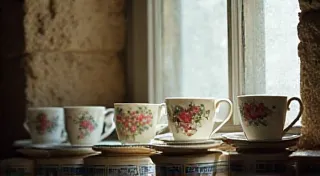Silent Stewards: Herbs & The Microbiome of Your Pet
There's a quiet elegance to an antique accordion. Not the boisterous fanfare you might imagine, but a deep, resonant stillness. It’s the quiet of crafted wood, meticulously fitted bellows, and keys worn smooth by countless melodies. Holding one, you’re holding history – a tangible link to a time when music was often handmade, deeply personal, and intrinsically woven into the fabric of daily life. I remember my grandfather, a master carpenter, would spend hours restoring these instruments, treating each piece of wood with reverence. He's the one who taught me to look beyond the surface, to appreciate the unseen forces that contribute to a thing’s true nature – a lesson that’s profoundly shaped my understanding of natural wellness, particularly when it comes to our beloved pets.
Just as the health of an accordion relies on the careful balance of its components – the airtightness of the bellows, the responsiveness of the reeds, the integrity of the frame – the well-being of our animals hinges on a complex and often overlooked ecosystem: their gut microbiome.

The Invisible Garden Within
The gut microbiome – the collection of trillions of bacteria, fungi, viruses, and other microorganisms residing in our pets’ digestive systems – isn't just about digestion. It's a vital organ, influencing everything from immune function and nutrient absorption to brain health and behavior. An imbalance – dysbiosis – can manifest as a range of issues, from digestive upset and allergies to anxiety and a weakened immune system. Modern pet food, often processed and lacking in the natural diversity that our ancestors’ animals enjoyed, can contribute to this imbalance. Antibiotics, while sometimes necessary, can decimate beneficial bacteria, leaving the gut vulnerable.
Think of it like this: a finely tuned accordion produces a beautiful, complex sound. But if the reeds are damaged, the bellows leak, or the frame is warped, the music suffers. Similarly, a disrupted microbiome leads to a diminished quality of life for our pets. Understanding how to evaluate a pet’s acceptance of new flavors and herbs can be key to a successful integration of natural remedies; some animals may be more discerning than others, and recognizing that is part of the process. You might find related insights exploring beyond the taste test – it’s a delicate dance between providing wellness support and respecting your pet’s preferences.
Herbal Infusions: Gentle Restoration
For centuries, humans have instinctively turned to plants for healing – a practice now increasingly validated by modern science. Herbal infusions, when used thoughtfully and safely, can be a powerful tool for gently restoring balance to a pet’s gut microbiome. It's not about a quick fix; it’s about supporting the body's natural healing processes. The key, as with any intervention, is knowledge and caution.
Certain herbs possess prebiotic properties, meaning they feed beneficial bacteria. Others have anti-inflammatory effects, soothing irritated gut linings. Still others may help to gently detoxify the digestive system. But it's crucial to remember that "natural" doesn't automatically equal "safe." Many plants that are harmless to humans can be toxic to animals. A thorough understanding of herbal safety and appropriate dosages is absolutely essential. The nuances of what works for one pet might not suit another, particularly when considering breed-specific needs and sensitivities. You’re often working with a complex interplay of genetics, environment, and lifestyle factors. Investigating whispers from the meadow, and understanding the responsible way to harvest wild herbs, can prove invaluable.
Chamomile, for instance, is a gentle relaxant that can soothe anxiety and improve sleep – often a consequence of digestive discomfort. Ginger is a well-known digestive aid, helping to relieve nausea and bloating. Dandelion leaf, often discarded as a weed, is a gentle liver tonic that supports detoxification. However, a small dose of eucalyptus oil can be fatal to a cat. Similarly, certain herbs are contraindicated for pets with specific health conditions. Always consult with a qualified veterinarian or holistic practitioner before introducing any new herbs into your pet’s diet.
My grandfather, with his carpenter's eye, always emphasized the importance of using the right materials for the job. He wouldn't use pine for a violin, knowing its properties wouldn't allow for the resonant tone a musician desired. Similarly, we must choose herbs that are both safe and appropriate for the individual needs of our pets.

Safety First: A Foundation of Knowledge
When crafting tea blends for your pets, the following principles are paramount:
- Species-Specific Considerations: What's safe for a dog may be toxic to a cat or rabbit. Cats, in particular, are highly sensitive to certain plants.
- Dosage is Key: Less is often more. Start with small amounts and observe your pet's reaction.
- Quality Matters: Use organic, ethically sourced herbs whenever possible.
- Avoid Essential Oils: Essential oils are highly concentrated and often toxic to pets.
- Observe and Document: Keep a record of what you give your pet and how they respond.
Tea Blend Recipes (Consult with a veterinarian before use):
- Calming Blend for Dogs: Chamomile (1 tsp), Lavender (pinch - be cautious, some dogs are sensitive), Oat Straw (1 tsp).
- Digestive Support for Cats: Catnip (small amount – monitor for overstimulation), Ginger (tiny pinch). (Again, veterinary consultation is vital).
- Gentle Detox for Rabbits: Dandelion Leaf (1 tsp), Fennel Seed (pinch).
These are merely starting points. Experimentation should be guided by careful observation and veterinary input. It’s important to remember that intuitive care and deep listening to your pet’s response are as vital as any recipe. Sometimes, an animal's innate wisdom can guide you towards solutions that textbook knowledge might overlook. Recognizing and trusting that inner voice – that quiet knowing – is a cornerstone of holistic pet care. Understanding that connection can be a pathway to healing and balance. Sometimes, this deeper understanding can uncover subtle signals - a change in gait, a shift in appetite - that point to imbalances requiring attention. For those looking for ways to easily integrate these practices, beyond the bowl offers a peek into incorporating these herbal infusions as part of your pet's daily routine.
Beyond the Blend: A Holistic Approach
Herbal infusions are most effective when integrated into a holistic approach to pet wellness. A healthy diet, regular exercise, mental stimulation, and a loving environment are all essential components of a thriving microbiome. Just as the care and maintenance of an antique accordion extends beyond a simple cleaning – requiring adjustments, repairs, and a deep understanding of its mechanics – so too does the well-being of our pets require a multifaceted approach. Paying attention to subtle cues can be just as important as the herbs themselves – a twitch of the ear, a change in breathing pattern. These seemingly insignificant details can provide invaluable insights into your pet’s overall health and wellbeing. Moreover, the relationship you foster with your pet - the trust and understanding that develops over time - forms the very foundation of its wellbeing.

The Quiet Legacy of Healing
The practice of using herbs to support animal health is a quiet legacy, passed down through generations. It's a practice rooted in a deep understanding of nature's gifts. It’s a practice now increasingly validated by modern science. Herbal infusions, when used thoughtfully and safely, can be a powerful tool for gently restoring balance to a pet’s gut microbiome. It’s not about a quick fix; it’s about supporting the body's natural healing processes. The key, as with any intervention, is knowledge and caution.





